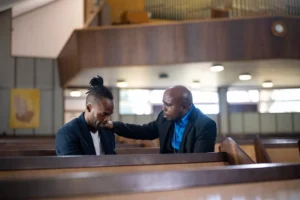If you believe G. K. Chesterton’s short stories, Father Brown was a very humble man — and his appearance proved it. He was a round-faced, unobtrusive clergyman; a poindexter you’d hardly notice in a crowd. Brown’s voice was a dull monotone and his garb colorless.
But Father Brown hid an astonishing secret beneath the façade: He was a gifted detective who solved police-confounding cases again and again. His best friend — Flambeau, a former thief turned private detective — marveled at the priest’s skill in unraveling mysteries.
Brown’s dislike of the spotlight, however, kept his methods of detection a secret. This reticence vexed his admirers (and not a few captured criminals) because everyone was left to guess at his technique.
One day, an American visitor called on Brown. The man cheerfully told Brown that his crime-solving prowess was being attributed in the press to paranormal, psychically acquired wisdom.
That’s when the orthodox padre — who believed in one God, Father of all true wisdom — was finally compelled to confess his secret. He reluctantly admitted his hidden method for solving a hundred crimes. And it was quite simple: He had committed every one of them.
The American listener was taken aback. Was this saintly sleuth a serial killer by stealth? Was he a new Napoleon of Crime, who acted the role of a detective to pin blame on others for his atrocities?
The answer was a resounding no — and yes. Father Brown’s hands never shed innocent blood. But he’d plotted and imagined a hundred dark crimes, and that was the secret to his success. Brown could strip away his polite pretensions and moral platitudes to expose the inhuman beast within.
He knew a murderous thief was hiding, barely contained, under the brim of his hat. So it was no great stretch to solve a dastardly murder — because he was quite capable of duplicating it in his mind. Father Brown said it was a priceless spiritual exercise to vicariously inhabit the souls of crooks.
Yet in the moment it took Brown to explain what he meant, the American visitor saw the padre as something less than a fellow human — something sinister and dangerous. He saw the humble Brown as a criminal, a psychological aberration, the chief of sinners.
Father Brown became, at least for an instant, a monster.
Why People Do What They Do
It’s not uncommon for me to get choked up when I write. I inhabit the world of my characters, fictional or real, a bit more than I’d like. But a combination of sadness and anger — literally flinging interview notes across the room while tears flowed — was a unique experience. It only happened once, and it was while I penned an article on child sexual abuse.
I started by interviewing a woman who was terrorized 20 years ago by her stepfather. Seen through her eyes, the abuser was a barely human fiend who got his jollies from locking his tween stepdaughter in her bedroom. He’d beat her black and blue before raping her — sometimes daily. She honestly thought he’d kill her before she was out of high school.
I talked to the mother of another victim, a child from Russia who was molested by her adopted grandfather. The daughter was victimized for years whenever she was left alone with Grandpa, starting when she was only 5. She lived with that hideous secret alone until she finally revealed her pain as a teenager.
I also questioned therapists, detectives and prosecutors — the professionals left to pick up the pieces after a child is destroyed by pedophilia. Then I pictured what would happen if one of my youngest drama students — a second or third grader like Kaylee or Lila, still discovering the world and her own self — was raped by an adult she trusted.
I normally abhor violence. But if I found out one of “my” girls was being raped on a regular basis, I might forget my principles. Sexual deviants are one of our culture’s only remaining bogeymen, and for good reason.
Still, to be fair (as journalists are supposed to be) I needed one more interview to complete my article: someone who could speak on the monsters’ behalf. I called a state prison and asked for a therapist who treats sex offenders. This counselor, who had to sit across from the bogeyman every day in an attempt to render him harmless, might be able to help me understand the monsters. At least a little.
Imagine (the therapist told me) a man who grows up in an abusive home and gets tormented further by schoolyard bullies. Imagine him as a perpetual friendless outcast, never learning to interact with his peers. Adult relationships remain a mystery long after he’s “grown up” and tossed into an incomprehensible world.
Eventually, the future molester finds love — or at least he thinks so. He’s the new husband (or live-in boyfriend) to a single mom. But without relational skills, wedded bliss doesn’t last. He comes under a tremendous amount of stress: child-rearing duties when he’s still part child; marital arguments and cold distance that could lead to divorce court. Maybe he loses his job, and now he’s depressed and despised on top of everything else.
Then imagine that this man — alone, struggling, secretly terrified — finds a willing listener in his own house. It’s his stepdaughter, a girl of maybe 6 or 10 years. She seems to understand him, and she’s much easier to talk to than the adults he can’t comprehend.
Our man doesn’t understand much about relationships, but this much he does — when someone of the opposite gender understands you, you’d earnestly like a romance to follow. With romance, of course, comes sex. And that is where his sin begins.
The molester knows it’s wrong. He can barely believe it’s he who desires these things with a young girl. But he begins to have fantasies, and they’re one of the few things that distract him from his miserable life. Temptation builds with the stress. Then one day when Mom isn’t home, he begins touching his stepdaughter intimately. And once he’s gone that far …
A Forgiven Monster
This story, told by the therapist as an anonymous amalgamation of his clients’ tales, didn’t make me pity sex offenders. I didn’t begin excusing or explaining away the crimes. I’m grateful for prisons and for therapists willing to work with these men.
But I did acquire frightening new knowledge: Suddenly, I understood how sex offenders could commit their heinous sins. It’s easy to hate a monster, yet I found it hard to hate molesters. I was left to whisper a silent prayer: There but for the grace of God go I. Who knows what kind of monster I might be if I experienced their temptations?
Easter is coming, and Holy Week brings a remembrance of one of my favorite tales of grace — the story of a forgiven monster. One of the criminals crucified beside Jesus (probably a thief and murderer) pled for absolution from the Christ as he hung on a cross. And remarkably, he was pardoned — Jesus took him to heaven the same day.
Still, we’re accustomed to thinking of that story only from the thief’s perspective. We see Easter as the celebration of our unbelievable restoration to life, just like that criminal. We appreciate our gift of forgiveness, praise Jesus and move on.
But shouldn’t we also see the story through the eyes of Christ? Shouldn’t we watch how He regarded the thief on the cross, then go and do likewise? Imagine Jesus’ heroic self-sacrifice, extending mercy to a monster in the midst of His own unbearable pain. Imagine the suffering Christ, trying to recognize a future heavenly citizen underneath a crucified sinner. Consider the beauty He created in telling a dying outcast he’s loved for the very first time.
That kind of mercy is inconceivable to us. How did Christ do it? “Well, because He was God,” you say. “Isn’t it obvious?”
But I don’t think that’s completely true. Being divine enabled Jesus to remain sinless, but that’s not why He could reach out to the thief so effectively. Christ empathized with the thief because of their shared humanity.
Jesus was tempted in every way, so He didn’t piously (but unfeelingly) exhort the thief to reform his life. Jesus knew temptation; He knew what a human soul was capable of from the inside out. He understood how this man could fall into heinous sin because He understood how hard it was to resist evil. And that’s why Jesus could give grace (without a single word of reproof) to a piece of human refuse.
From Sinner to Saint
Seeing the man beneath the monster is possible for Jesus. But for us? It’s simple enough in the abstract, yet when we try to apply grace to specific child molesters or murderers or evil bosses or intolerable roommates, it’s beyond us.
Unless, of course, we can look into our own inner darkness enough to understand the other sinners in our lives — understand that we have met the enemy, and he is us. Then the souls of the thieves on the crosses all around us become mirror images of our own soul.
After Father Brown explained his detective techniques, his American visitor was incredulous. It’s not that the man disbelieved Brown’s results — the priest had been a successful sleuth for years. But the American had grave doubts about his wisdom.
“I hope you never tell the criminals you ‘understand’ their offenses!” said the visitor. “It would only give them a license to sin. Don’t abandon justice! If we had a criminal here — right in this room, where we could speak to him — you’d understand the danger of cheap grace. But we’re respectable people, you and I, so you can safely theorize from your armchair.”
That’s when Flambeau — the former master criminal who’d been virtually silent — finally spoke up. “You do have a criminal here,” he said quietly. “I was a thief and a fugitive for years.”
The American had no idea. He remained silent, riveted to his chair.
“‘Respectable’ people looked down their noses on me; I despised them,” Flambeau continued. “I heard their self-righteous lectures and the whispers that I was a monster; I ignored them. But Father Brown treated me as a human being and said he understood what led me into darkness. I haven’t committed a crime since.”
Everyone else thought Flambeau’s actions were too heinous for any decent person to contemplate and made the criminal a pariah. Father Brown knew he was quite capable of the same crimes and gave Flambeau more than compassion — he gave empathy. Knowing someone understood the depths of his struggle with evil is what converted Flambeau from a sinner to a saint.
As for the American visitor, he didn’t know what to say — but he finally understood the power of grace.
If we strive to imitate Jesus all the way to the cross, we have to learn the same empathy Father Brown gave to Flambeau. We must whisper softly in our prayers, “There but for the grace of God go I” — and mean it. Then Jesus’ sacrifice can give us the courage to care for people we hate, and the Spirit of God can transform a sinner like Flambeau. Only the remembrance of the monster within allows us to love the monsters without.
Copyright 2012 George Halitzka. All rights reserved.









